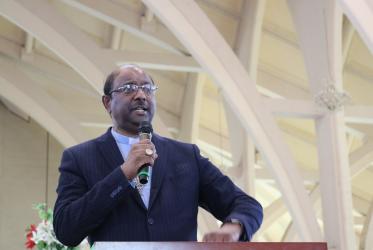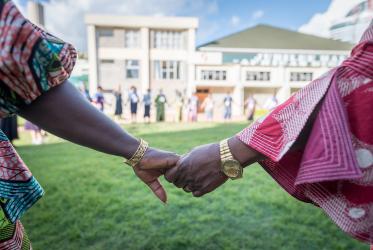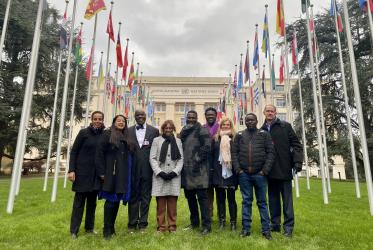Presentation on Disability and Globalization
by Litha Musyimi-Ogana
Advisor: Gender and Civil Society Organizations CSOs), NEPAD Secretariat during Consultation held in Johannesburg, 2-6 November, 2004
The Chairperson, Government Representatives, Development Partners, Distinguished delegates, Ladies and Gentlemen,
On behalf of the NEPAD Secretariat I wish start by thanking the South African Council of Churches for inviting NEPAD secretariat to participate in this important conference.
When I received the invitation to make this presentation, I was not sure of what you would like me to share with you. However, I thought it as a good opportunity to come and listen to your views and share with you efforts the NEPAD Secretariat has put in place for the effective participation of Civil Society Organizations (CSOs) as well as engender the NEPAD process. First of who are CSOs according to NEPAD definition?
Definition
- CSOs include but are not limited to
- Registered Non-Governmental Organizations
- Community Based Organizations
- Trade Unions,
- Professional/academics organizations
- Legitimate networks,
- Faith based organizations
- Legitimate groups representing the youth groups, people living with disabilities and marginalized person.
- Supportive social movements. The list is still open.
In order to ensure that all key stakeholders particularly the Civil Society are effectively involved in the NEPAD process and particularly in the implementation phase, I endeavour to make my presentation by trying to answer three key questions, namely:
Where are we coming from?
Where are we now?
Where are we going?
Where are we coming from? NEPAD/CSO ENGAGEMENTS
The NEPAD CSO engagements started immediately the NEPAD foundation document was officially release and can be described as extremely healthy, challenging, thought provoking and to some extent academic. I would like to sum up four phases in which NEPAD Secretariat can summarise.
Phase 1
Phase one was seen as an organized CSO-only type of engagement, which I prefer to call the mis-understanding phase.
It was also seen as an immediate reaction to the genesis of NEPAD document and culminated in a big CSO meeting in Bamako.
Phase II
Phase two was seen as an ad-hoc engagement between civil society organisations and the architects of NEPAD.
It consists mainly of briefings to African CSO participants in various for a particularly in big UN conferences held between 2000 - 2003.
Examples are Financing for Development (FfD) and the World Summit for Sustainable Development (WSSD).
Phase III
Phase three was seen as organised engagements between NEPAD and CSOs which was spearheaded by the NEPAD Secretariat.
It comprised of several meetings organized by the NEPAD Secretariat.
They include:
- Elmina-CSO/NEPAD
- NEPAD/CSO/private sector
- Gabon Gender Summit
- Maputo African Union CSO/NEPAD
Phase IV
- The NEPAD/CSO Maputo meeting ushered in a new chapter in the engagement of CSO and NEPAD Secretariat. At the end of these consultations the following challenges were identified at the sub-regional level.
- Managing the participation of CSOs at sub-regional level, coordination of understand nature, operations and role of different regional economic regimes.
- CSO participation in communication and advocacy on NEPAD and the need to build CSO capacity to understand the NEPAD process itself, support and participate in its implementation
- The nature, operations and role of different Regional Economic Commissions (RECs) and mechanism of engaging with them at the sub-regional level.
- Strengthening the understanding of integration process of different sub-regional economic regimes and how they can deliver a Visa free Africa.
- Setting up of sub-regional mechanism for the coordination of CSO/NEPAD
- Popularizing NEPAD and improving relationships between CSOs, governments and the private sector.
- Capacity development within CSOs to effectively participate in the implementation, monitoring and evaluation of NEPAD
- Processing and stepping down knowledge on new ideas rolling out of the NEPAD secretariat action plans such as Peer Review Mechanisms to national level.
- Establishing and Maintaining Mechanism for continuous consultations between NEPAD and CSOs at all levels.
Where are we now?
In the post Maputo Summit the NEPAD Secretariat taken major steps in
- Streamlining its engagements with CSOs erg practicing an open door policy.
- Putting an institutional mechanism in place within NEPAD organizational structure.
- Ensuring a systematic and programmatic response to the challenges at hand such as the engendering the APRM reviewed guidelines and the SADC basic education strategy
So far the NEPAD Secretariat has
- Created the office of CSO and Gender Advisor at the Secretariat
- Resourced for this unit
- Is now in the process of operationalizing the CSO and Gender Unit
- The unit has already developed a one year work plan.
The mandate of CSO and Gender unit will be twin fold:
- On the gender side it will gender mainstream all new documents rolling out of the NEPAD Secretariat and the implementation process through working with a gender taskforce
- On the CSO side it will coordinate, mobilize and enlist effective participation and involvement of CSO in the implementation of the NEPAD, within the context of ongoing ECOSOCC consultations which NEPAD has been participating in.
Where are we going?
Activities that have already been prioritised for the first one year include:
- Operationalizing the CSO and Gender Unit at the NEPAD secretariat
- Providing on-going gender expertise at the NEPAD Secretariat
- Development of a Gender Policy for NEPAD Secretariat
- Development of a Gender and CSO Strategy for NEPAD Secretariat
- Identifying, inventorizing and creating a CSO data base
- Identifying key CSO stakeholders with thematic expertise in priority sectors in NEPAD
- Create and operationalize a Gender Task Force, again with thematic expertise
- Operationalize thematic NEPAD/CSO Focal points at sub-regional.
Conclusion
The NEPAD Secretariat takes this opportunity to assure CSOs in Africa and people living with disabilities in particular that NEPAD will work closely with all the stakeholders and looks forward CSO positive advocacy and communication on NEPAD as it moves into the implementation mode.
The Secretariat wishes to thank all the CSOs for their never tiring contribution and constructive critique of the NEPAD process look forward to positive contributions and constructively critiques.
Together we believe we shall pt our countries individually and collectively into the path of prosperity and sustainable development.
Thank you.




